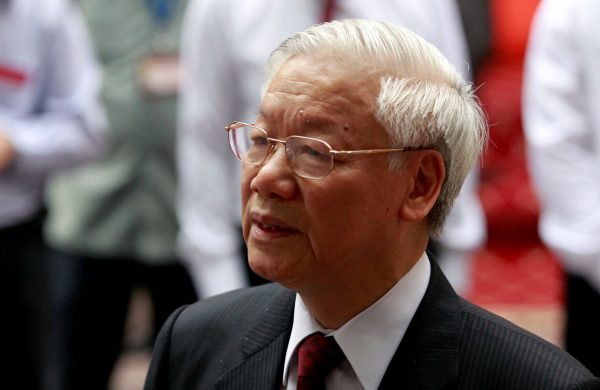On 8 January 2020, the Central Commission for Inspection (CCI) issued a public statement recommending the CPV Politburo take disciplinary action against the former powerful party boss of Ho Chi Minh City, Le Thanh Hai. Hai was a Politburo member for 10 years, with a number of wrongdoings relating to land appropriation for development of the new Thu Thiem urban zone in the city.
The current Party chief of Hanoi, Hoang Trung Hai — a Politburo member andformer deputy prime minister — also committed serious violations concerning massive monetary losses while implementing phase two of the Thai Nguyen Iron and Steel project (known as TISCO II). Hai is expected to be re-elected to the Politburo at the CPV’s 13th Congress next year, when he would be only 62 years old. On 10 January, the Politburo chaired by General Secretary Trong decided to give Hai a warning, the second of four progressive disciplinary levels according to CPV rules.
Taking disciplinary action against an incumbent and a former member of the Politburo in the first week of 2020 — just two weeks prior to the Lunar New Year, a traditional occasion where Vietnamese people expect the most auspicious and happiest news — demonstrates the CPV’s determination to combat corruption. Never have so many current and former party members and government officials been brought to court in relation to corruption charges.
According to the CCI’s reports, 1111 party organisations, 18,265 members of party committees at all levels and 54,573 party members have been subjected to discipline of one type or another since 2016. The Central Committee, the Politburo and the Secretariat took disciplinary action against 111 party members, 92 of whom were under central supervision and management. This includes two Politburo members, 21 members and alternate members of the Central Committee, and 23 generals among 38 senior officers in the military and public security forces. These figures are part of the remarkable legacy of the 12th Central Committee and General Secretary Nguyen Phu Trong — who is also chairman of the Central Steering Committee for Anti-Corruption (CSCA).
This legacy is linked with the popular ‘furnace blazing’ (đốt lò) campaign branded by General Secretary Trong. The campaign carried out anti-corruption efforts against incumbent and retired junior and senior party and government officials. In April 2019, when Trong suddenly fell ill and disappeared entirely from the public scene, there were concerns that the campaign would slow down or even grind to a halt. If this happened, rent-seekers in the party and corrupt officials would perhaps take a sigh of relief.
The ‘furnace blazing’ campaign was seen by many Vietnamese political observers as a way for Trong and his camp to punish and politically purge those who were in the camp of former prime minister Nguyen Tan Dung, Trong’s speculated rival for the General Secretary position in 2016.
Trong re-appeared in public one month later and was seen chairing meetings of the Politburo and Central Committee. At these meetings, Trong reiterated corruption fighting in tandem with preparations for the Party Congress. Trong had to cancel his visit to Washington intended to improve Vietnam–US bilateral relations amid China’s aggressive intrusion into the country’s exclusive economic zone, and delegated other presidential and party duties to deputies. Despite this, Trong’s emphasis on the importance of continued anti-corruption efforts in his first re-appearances illustrated his desire to make the ‘furnace blazing’ campaign his signature legacy.
A government report presented at the end-of-year session of the National Assembly stated that investigation, prosecution and trials of economic and corruption cases monitored by the CSCA would speed up in 2020. On 15 January, Trong requested the CSCA to ‘concentrate its guidance on accomplishing investigations of 21 cases, completing the verification and handling of 21 incidents, prosecuting 23 cases, initiating preliminary trials of 29 cases, and appellate trials of 7 cases as planned. Particularly, 10 serious and complicated cases that have drawn public attention need to be brought to court for first-instance trials’.
Speaking at the CCI’s 2019 national conference, Tran Quoc Vuong — executive member of the CPV Secretariat and a speculated candidate to succeed Trong at the 13th Congress — instructed that the inspection sector needed to work harder in 2020 to contribute to ‘the preparation of personnel of party congresses at all levels as well as members of the 13th Central Committee’. The CPV has a sincere need to remove ‘negative, corrupt, ideological backsliding elements’ from the party to gain public trust and reinforce legitimacy. Though the lack of transparent procedures and the absence of a free media also results in speculation about in-fighting within the party for power.
It is the year of rat in 2020. Chairman Trong once said fighting corruption is like ‘catching the rat without breaking the pot’ — implying that fighting corruption is necessary, but maintaining social order and keeping the political regime stable is equally important. Anti-corruption efforts are expected to continue in 2020. But to what extent does the CPV want to expand? How will the CPV let the rat and pot metaphor impact the ‘furnace blazing’ campaign? In addition, Vietnam’s busy schedule with commemorative ceremonies, meetings under its chairmanship of ASEAN and now the response to the deadly coronavirus outbreak may affect the campaign. We must ‘wait and see’.
Hai Hong Nguyen is an Associate Researcher at the Centre for Policy Futures, Faculty of Humanities and Social Sciences, The University of Queensland.

